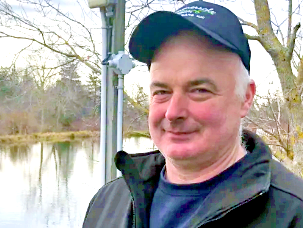STILLED WATERS
P.E.I. potato farmers pleased corporate bid for more water fails

Doug Campbell, district director with the P.E.I. National Farmers' Union
It’s Bud the spud from the bright red mud
Rolling down the highway smiling
The Spuds are big on the back of Bud’s rig
They’re from Prince Edward Island
— Stompin’ Tom Connors —
POTATOES ARE BIG ON P.E.I. Maybe too big. Unless you are billionaires like the Irving clan.
The iconic truth in Stompin’ Tom’s song is that spuds were what made P.E.I. famous and many farmers prosperous. Not so much any more. Now the ravenous pursuit of profits from processing potatoes is making life precarious for more and more P.E.I. farmers and is even a threat to the long-term health of all farmland on the island.
Processors vs. farmers
It takes land and water to grow potatoes. The trouble starts when it comes to deciding how much land and how much water. This turns into a tug of war between corporate agribusiness and smaller family farmers
Agribusiness wants more and more land and more and more water. A 2002 provincial law put a moratorium on high-capacity wells. It means new crop irrigation systems have not been allowed. A recent legislative committee review left the moratorium in place.
Agribusiness in PEI was not amused. The family farmers in the Nation Farmers Union were pleased but wanted more.
Protecting P.E.I. water is good, said Doug Campbell, district director with the National Farmers Union (NFU), but the larger issue of overall soil health and sustainable farming remains.
“It needs to be related to an overall issue of, why are we asking for the water? Why do we have no organic matter in our soil? The reasons for that is because of the way the land is being farmed, why is that, because of pressure from industrialized farming.”
The NFU takes the position that if the role of water is to be extended in agriculture production, then its usage must be a regulated part of a far broader strategy that addresses stewardship of the land and the greater good of farmers, the environment, and rural communities.
An NFU brief to the recent hearings on the water moratorium states: “It is true some Island farmers are asking for irrigation rights, but not all Island farmers are asking, nor would all farmers need irrigation to the same extent or could even use it.
“It is no secret that the main player in the 'ask for irrigation' is Cavendish Farms processor, Robert Irving. Irving, who is already accessing large amounts of Island water, is very open and vocal about his water irrigation wants for his family potato operations, and his growers.
Campbell said government needs to take a closer look at land ownership and the effect certain farming practices have on soil quality.
It’s all about the land
Island history is steeped in the land question. Concern over the threat from absentee, foreign, and corporate land ownership and control never goes away. The 1982 Lands Protection Act was an attempt to meet that threat head on.
Farmers feared expanding land ownership by big potato processors, like Cavendish Farms, would put processors in direct competition with farmers and give processors even more control in the potato sector.
In the early days of the Lands Protection Act, processors like Cavendish Farms, even had to divest themselves of some land in order to comply with the provisions of the act.
'Spirit and intent'
As the NFU brief states: “The Spirit and Intent of the act was to ensure farmers farmed and processors processed.”
But, if that “spirit and intent” ever existed, it does not now. Government after government has allowed the Irving processing family to buy more and more land. They are now in direct competition with farmers, which gives them extensive control over farmers and government.
The pandemic has shone a bright light on some of the dominant realities of industrialized vertical integrated farming. Take for example the 4.7-million-dollar taxpayer gift to Cavendish Farms, quickly arranged through the potato marketing board, after the billionaire processor hinted pandemic disruptions might mean his contract- growers might have to look for other off-island markets.
The NFU brief states: “The concerns surrounding our land can’t be separated from the usage of water. If exploitation of the land is allowed to continue, then exploitation of water will increase....“The taps just can’t be turned on to increase the profits of certain players nor can it be self-regulated,...“There is no room on this small Island to allow the interests of a few to overpower the greater good.”
But the brief also warns the decision to extend the water moratorium “only kicks the can down the road.” The larger issue remains: who really owns P.E.I.?
Islanders have been battling over that since the tenant farmers rebellion in 1866.
- 30 -













Add new comment